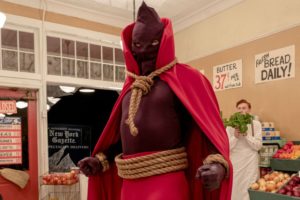Recently, Regina King attended the San Francisco “Watchmen” premiere, organized by HBO, presenting Damon Lindelof‘s (“The Leftovers“) bold, highly-acclaimed adaptation of Alan Moore and Dave Gibbons‘ iconic, comic book series. A thorough departure from the majority of the graphic novels, Lindelof’s envisions a new alternate universe in which white supremacy has seemingly risen to power since the Tulsa Race Riot (Black Wall Street Massacre) in 1921, using the Rorschach mask as a symbol of hatred, many of the heroes readers are used to seeing are mere, revisionist propagandistic stories of an era long gone, the police force now the modern-day Watchmen.
After the screening, King participated in an insightful Q&A moderated by the San Francisco Chronicle contributing TV writer Tirhakah Love, during which she mentioned, “This show is like a genre gumbo. We have so many different genres going on, and [Damon’s] been able to titillate, through the depiction of historical events, an alternate history, sci-fi, romance, comedy.” Indeed, “Watchmen” is an impressive blend of genres.
“Watchmen” is a show that may cause a contentious or visceral reaction among its viewers because of its complex subject matter. However, it is portrayed respectfully and through a team of diverse writers.
“Once I was in, and I was in because of my experience with Damon on ‘The Leftovers,’ he made sure he had Black women as writers,” King said. “And he was very smart, and I feel responsible in making sure that he did that because for a lot of Black people who are just only seeing the first episode like, ‘What the fuck? What are you trying to say about police?’ It feels offensive for some. And some white people are like, ‘Are you trying to say Black people were in charge?’ No, nobody is the fuck in charge.”
After the premiere, I had an opportunity to chat with King about why she took a chance on Lindelof’s amalgamation of genres, “Watchmen’s” commentary on appropriation, her burgeoning production company, Royal Ties, and more.
When you first read Damon’s script, among the many facets of the story – the action, the sociopolitical commentary, the historical context, the character development – what appealed to you the most?
Honestly, my dear, I can’t say that it was one. It was the fact that it was a combination of all of the four that appealed to me. Because I’ve never seen that before. Normally, if you hear that as the pitch, you immediately think, “Yeah, that’s not gonna work.” And that wasn’t part of the pitch, so I went into it not expecting a particular thing. And it was because it was all those things that made me feel like, “Well, here’s an opportunity to get a lot of different bodies, not just a certain audience.” But it’s an opportunity to get a lot of different audiences that gravitate to a particular thing.
Read the rest of the interview at The Playlist.




![Regina King Talks The Mixing Of Genres In ‘Watchmen’ & The Series’ Social Commentary [Interview]](https://www.makingacinephile.com/wp-content/uploads/2019/10/Regina-King-Watchmen-1200x520-900x350.jpg)

![Kieran Culkin Talks HBO’s ‘Succession’ And The Therapeutic Benefits Of Playing Sociopaths [Interview]](https://www.makingacinephile.com/wp-content/uploads/2018/07/Kieran-Culkin-Succession-HBO-1200x520-300x200.jpg)
![Emily Meade Discusses ‘The Deuce’ Season 2, Intimacy Coordinators & More [Interview]](https://www.makingacinephile.com/wp-content/uploads/2018/11/Emily-meade-the-deuce-1200x520-300x200.jpg)
Leave a Reply
Your email is safe with us.